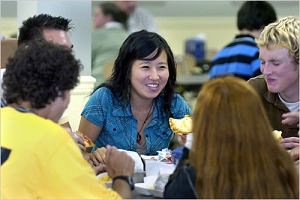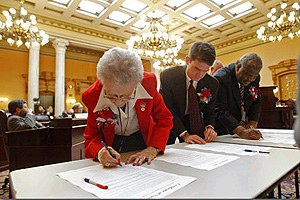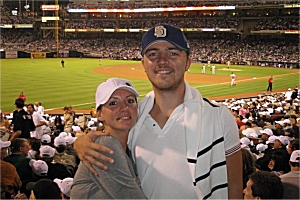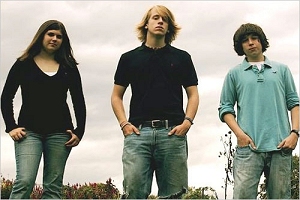Vice Versa
U.S. Student Visas Reach Record Numbers in 2007

In 2007, the Department of State issued a record number of student and exchange visitor visas -- more than 600,000 -- greater than 10 percent more than last year. The numbers are proof of the success of the U.S. government’s effort to reverse the drop in student and other visa applications after the terrorist attacks of September 11, 2001, U.S. Assistant Secretary of State for Consular Affairs Maura Harty told USINFO.
Speaking at the end of International Education Week, a joint initiative of the U.S. departments of State and Education, Harty said that “the best advertisement for America is America.” She said having foreign students in the United States is a matter of national security because academic visitors are the United States’ potential friends, allies and business partners.
“If they come to America … they will learn everything they possibly can about our culture, our people, our academic institutions. They’ll see the free lifestyle of the American college campus. They’ll have a chance to challenge themselves and grow in ways informed by what they learn about American society,” Harty said.
More than 200 alumni of U.S. exchange programs have become heads of foreign states or influential leaders in their own countries, according to State Department data. They include the presidents of Bangladesh, Indonesia and the Philippines and former U.N. Secretary-General Kofi Annan.
REGRETTABLE PERCEPTION
Harty agreed that the “regrettable perception” that the events of September 11, 2001, made the U.S. visa process more cumbersome was correct in the immediate aftermath of the attacks. But she said the “horror stories” of endless waits for name checks are a matter of the past. About 97 percent of people who are told their applications have been approved get their visas within two or three days, she said.
Since September 11, 2001, the United States had to put in place more stringent security measures. “At the same time, we’ve worked hard over the past years to streamline procedures and make the visa application process easier and more efficient,” Harty said.
“I regret that some people are hearing the old stories and applying them to the current situations,” she said.
The State Department also has made an effort to “demystify” the visa process, Harty said. Both the United States government and every U.S. embassy have special Web sites with information about the required documents, how far in advance an applicant can schedule an appointment for an interview and what to expect during that interview with a consular official.
In many countries, students can make interview appointments online, and they are usually put in the front of the line. “We won’t have a student miss their first day of class because we could not get them an appointment in time,” Harty said.
NOT A “GOTCHA” GAME
To qualify for a student visa, students must show three things: that they are genuine students enrolled in an American college or university; that they have sufficient funds to pay for their first year of study; and that they intend to return to their home country when they finish their education.
“We do need the applicants to explain to us why they want to study in America and … how their course of study in America is going to be applied in their life when they return to their country,” Harty said.
People who have been rejected multiple times should pay attention to what they were told during their visa interviews and think about whether their circumstances have changed before applying again, Harty said.
She stressed, however, that consular officials are not deliberately looking for reasons to reject visa applicants. “Put your mind at ease,” she advised students preparing for their interview. “It is not about ‘gotcha.’ We are not finding a way to refuse you because that is what we want to do. We are finding a way to identify as many legitimate travelers as we can and to facilitate their travel to the United States,” she said.
Harty, who traveled recently to Egypt, Jordan and Israel to meet with potential student visitors and their parents, said she carried the following message: “The welcome mat is out. If you haven’t checked in with us in a while, try us. You’ll like us. America is open to you and to your ideas and we welcome all legitimate travel to this country.”
For more information, see Study in the U.S./Education.
Information on U.S. visas and travel to the United States is available on the Web sites of all U.S. embassies and on the State Department’s http://travel.state.gov/ and http://www.unitedstatesvisas.gov/ Web sites.
Recently on Vice Versa
De la Democratie en Amerique, Des Elections en Amerique...
 Roberto de Primis is a political scientist. He works in the executive office of the French Community Parliament (Brussels). He is currently intern at Chaire Raoul-Dandurand en Etudes Strategiques et Diplomatiques - UQAM (Canada)
Roberto de Primis is a political scientist. He works in the executive office of the French Community Parliament (Brussels). He is currently intern at Chaire Raoul-Dandurand en Etudes Strategiques et Diplomatiques - UQAM (Canada)
De onweerstaanbare aantrekkingskracht van San Diego
 Ken Coppieters is a Belgian scientist at The La Jolla Institute in San Diego. He will regularly report on his findings of daily life in the USA.
Ken Coppieters is a Belgian scientist at The La Jolla Institute in San Diego. He will regularly report on his findings of daily life in the USA.
Dr. Ken Coppieters is als wetenschapper verbonden aan The La Jolla Institute for Allergy and Immunology en woont samen met zijn vrouw Helena Fiers in San Diego, California.
Win a three-week stay in the U.S.
 Essay contest: The Belgian-US Friendship -- How I see its Future.
Essay contest: The Belgian-US Friendship -- How I see its Future.
Belgian students have an opportunity of winning a three week cultural stay in the United States. Want to participate? All you have to do is write an essay on Belgian-American relations with the following title: The Belgian-US Friendship -- How I see its Future.
The winner of the contest will travel to the U.S. to take part in the Benjamin Franklin Transatlantic Summer Institute at Wake Forest University in North Carolina from July 5, 2008 to July 30, 2008.